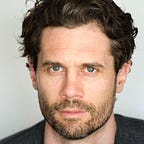Warning: May Cause Self-Loathing
I don’t like myself.
This is not something I ever thought I’d feel compelled to write, or even to think. When I was in second grade and some teacher or consultant or vice-principal came to our class to talk to us about self-esteem (because it was the eighties and the eighties were all about self-esteem), she reminded us that it was important that we like ourselves.
I remember thinking, “Why wouldn’t I like me? I am me. I have to be around myself all the time; it would be terrible if I didn’t like me!”
Something happened between then and now. That something was a basketball career that was far more successful than I ever could have imagined.
I began playing basketball for all the right reasons. It was fun. I liked doing it. It made me feel good.
I kept playing basketball for all the wrong reasons. It made people notice me. It made people like me.
When people imagine what it’s like to be a professional athlete, they extrapolate from their own experiences. For most, that means thinking back to high school. In their minds, then, professional basketball must be like high school basketball: mostly fun, mostly healthy, and not all that taxing on one’s psyche.
While that image of professional basketball holds true for some (Derrick Rose, possibly), it doesn’t hold true for most. When money, fame, and power are introduced, basketball changes from a game to something else entirely. Some basketball players are able to manage this change. For others, the sport becomes a vampire.
I found in the space between a basketball court’s lines a place where I was special. Where it didn’t matter if I knew how to talk to girls or boys or kids or adults. People wanted to talk to me because I could put a ball through a hoop.
For reasons I’m only beginning to understand — maybe my parents, maybe the genes I was blessed or cursed with, maybe the water in Meriden, Kansas — I became intoxicated by the access I had to outside approval. Pretty soon, liking myself wasn’t enough; I needed everyone else to like me.
Then, I put myself in the worst place imaginable for the sort of reverse narcissist I was becoming: in front of a lot of people. On stage, literally and figuratively. I played for huge crowds in college. Everyone on campus — hell, most of the people in the state that housed that campus — knew who I was. Afterward, a professional career that was never as grand as I had once hoped. But a professional career that was grand enough. When I sat down next to someone on an airplane, in a bar, at a restaurant, I could always count on his (or her) eyes lighting up when I said that I played professional basketball.
I knew this was destructive. I could tell that basketball and its rewards had the power to damage me; that I shouldn’t get too used to people thinking I was interesting or attractive because I was good at a sport.
But I also thought that, because I was aware of the effect this information had on someone’s impression of me, I could dodge the effect it might have on my brain, my heart, my soul, if that’s what you want to call it.
I was wrong.
External reinforcement poured in. It wasn’t always positive; there were plenty of people to tell me how bad I was at basketball, too. But whether you thought I was bad at basketball or good at basketball, you were interested.
And so, when my career ended just before a third surgery on my left ankle, I was like the Greek economy circa 2009: everything still looked okay from the outside, but it was all built on lies.
The second-grade version of my self-esteem was gone, trampled by all that outside validation.
I had stopped thinking of myself as worthwhile because I was a person — because I was someone I liked being around. Now I was worthwhile because I was a basketball player — because I was someone other people liked being around.
My basketball career gifted me travel, money (although not as much as you think), experiences that most people would give anything to have. But basketball cursed me, too.
Because, if basketball gifted me so much, what follows is this: if I hadn’t played basketball, I wouldn’t have had those experiences. Basketball made my life.
I can’t play basketball anymore; I’m too old, too broken-down, maybe never really good enough in the first place. Even if the end hadn’t come when it did, it would have come at some point.
And in my brain — addled as it is by years of this reinforcement added to the peculiar cauldron that is my original psychology — this means no more life.
Melodramatic? Perhaps. But also the truth. About retired basketball players. About retired workaholics. About anyone who sought validation from somewhere outside himself.
It doesn’t work, that. It might, in the short term. But not over a lifetime.
This doesn’t mean that I’m suicidal. I don’t actually think my life is over. Even though I was taught, for most of my adult life, that 34 was decrepit, I am, after all, only 34. There’s still time for a fresh start.
But that start isn’t an easy one. I’m like an toddler, just learning to walk. Or an amnesiac, learning who his friends are, and where he keeps his car keys.
Also like a child who can’t walk (and probably like an amnesiac), eventually, this will get better. People will probably like me, whether I’m a basketball player or not.
But only, I’m learning, if I figure out how to like myself.
Originally published at www.flipcollective.com on January 10, 2012.
